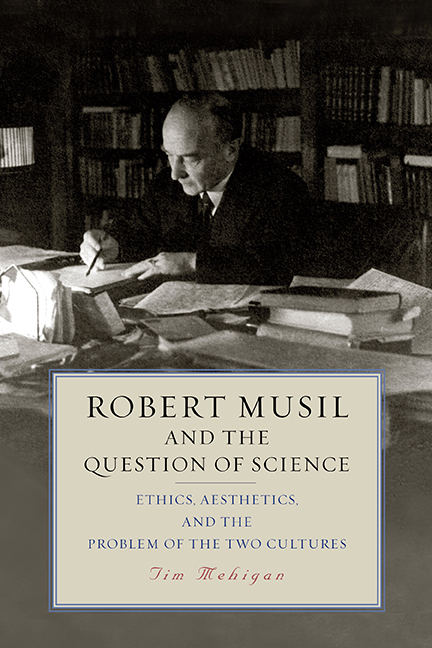Book contents
- Frontmatter
- Contents
- Preface
- Introduction: Musil’s Intellectual Position
- Part I Musil and the Two Cultures
- Part II Aesthetics and Ethics in the Context of the Two Cultures
- Conclusion: “A General Secretariat of Precision and Soul”: Ethics, Knowledge, and Literature after the Fourth Revolution 149
- References
- Index
- Frontmatter
- Contents
- Preface
- Introduction: Musil’s Intellectual Position
- Part I Musil and the Two Cultures
- Part II Aesthetics and Ethics in the Context of the Two Cultures
- Conclusion: “A General Secretariat of Precision and Soul”: Ethics, Knowledge, and Literature after the Fourth Revolution 149
- References
- Index
Summary
ROBERT MUSIL (1880–1942) is one of the most important writers of the twentieth century. He is considered one of the great modernist writers whose intellectuality and breadth of vision is approached by only two others: James Joyce and Marcel Proust. Musil's distinctiveness even in the august company of Joyce and Proust, however, is that he was qualified in two technical fields—engineering and philosophy—and drew questions from these fields into the heart of his literary project. As a result, Musil, alone among writers of his rank of any era, was able to produce a set of reflections of profundity and sagacity bearing on the capacity of science to influence the experience of ordinary living. It is to these reflections that the present volume draws attention and from which it takes its point of departure.
This volume has had a complex evolution. Several of its chapters were reworked from previously published materials in German. I would like to thank Micheil Paton for providing me with reliable translations of these materials. As I reworked these materials in English and as the concerns of this volume made their presence felt, a transformation of varying proportions occurred. Though some chapters still betray the purposes for which they were originally crafted, all now respond—I hope in valuable ways— to the present task, which is to assay “the question of science” in Musil from differing but related perspectives.
This volume owes its existence to the generosity of two outstanding funding bodies in Germany, the Alexander von Humboldt-Stiftung and the Deutscher Akademischer Austausch dienst. These two organizations have helped sustain a scholarly life in German letters over more than three decades. Thanks are also due to two Australian universities (Melbourne and Queensland) and one New Zealand university (Otago) which, through material support and time release, have played an enabling role in the research that appears here. I am also grateful for the advice and support of colleagues in the Institute for Advanced Studies in the Humanities at the University of Queensland and for comment provided by anonymous reviewers during the final stages of preparation of the manuscript. Finally, I thank the many colleagues, too numerous to mention, whose work has contributed—even more than I am able to acknowledge in this volume—to my own understanding of Musil's legacy.
Information
- Type
- Chapter
- Information
- Robert Musil and the Question of ScienceEthics, Aesthetics, and the Problem of the Two Cultures, pp. vii - viiiPublisher: Boydell & BrewerPrint publication year: 2020
